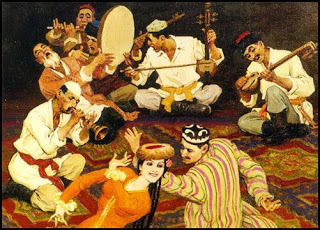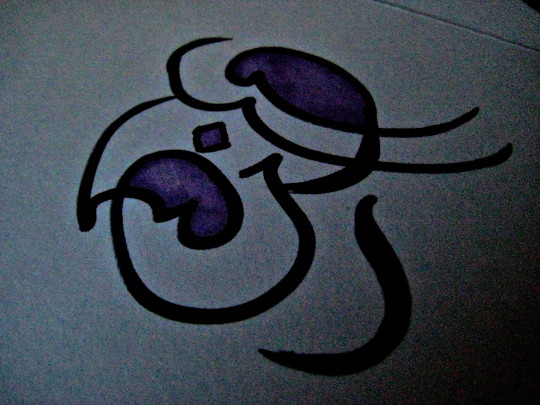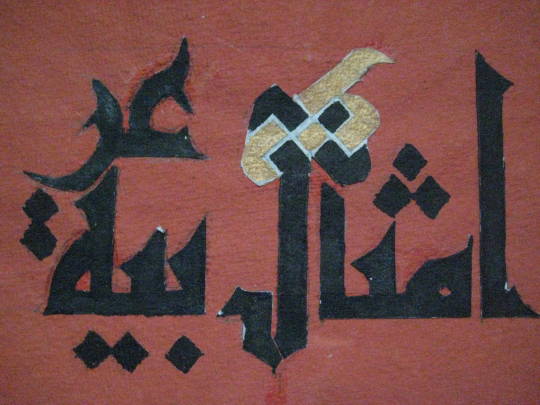Text
"الجود من الموجود"

Pronunciation: /el jood min el maw-jood/
English translation: "Bountifulness comes from what we have"
This proverb has a cute pronunciation because of the rhyme. It refers to being content with what one has. It is used in situations where one might be anxious about what they can offer (especially food or drinks) to guests.
6 notes
·
View notes
Photo

** طعمي التم بتستحي العين**
Pronunciation: /Ta'mi et tim, b'testehi al ayn/
Translation: "Feed the mouth, the eye will be meek"
Idiomatic English: "The closest way to a man's heart is through his stomach."
The English equivalent hints at gaining one's love through food. But the Arabic text refers to gaining the respect from food as "the eye will be meek" i.e. shy of looking up at the feeder. In the West, food is a route to the heart, but in the East, it is one to dominance.
يشير المثل الانجليزي ‘إلى الفوز بالحب عن طريق الطعام(الأكل). لكن المثل العربي يشير إلى نيل الإحترام من خلال الطعام حيث "تستحي العين ولا تقدر على النظر على مقدم الطعام.
الطعام في الغرب هو طريق للقلب بينما في الشرق هو طريق للسيطرة.
46 notes
·
View notes
Photo

"وديتني على البحر و رجعتني عطشان"
Pronunciation: /Waditni ala al-bahar w raja'tni atshan/
Translation: "You took me to the sea and brought me back thirsty"
Idiomatic English: "You urinated on my back and told me it is raining"
This proverb is used to express disappointment after getting one's hopes high, about an endeavour, an affair or something that one was impatiently waiting for.
Although one can't drink from the sea, the sea image is used cleverly to refer to the person's ability to persuade one that the sea water can indeed be drunk.
I got the idiomatic English translation from the great guys at Word Reference Forums.
يستخدم هذا المثل للتعبير عن خيبة الأمل بعد أن تعاظمت الأماني. قد تكون خيبة الأمل نتيجة لجهد لم ينجح أو بعد الوصول إلى نتيجة غير مرضية.
على الرغم من عدم إمكانية شرب ماء البحر، أستخدم تشبيه البحر بذكاء للتعبير عن قوة الإقناع التي جعلت من شرب ماء البحر أمرا ممكنا.
44 notes
·
View notes
Note
Arabic proverb: Do not use the same hand you use to slap your donkey to slap your wife, lest you become the beast you loathe.
Interesting. Never heard of it before, but I’ll search for it.
5 notes
·
View notes
Photo

****إِذا كانَ رَبُّ البَيتِ بِالدُفِّ مولِعاً فَشيمَةُ أَهلِ البَيتِ كُلِهِمِ الرَقصُ
Pronunciation: /in kana rabbu al bayt bildaff mowleyan fa shiimat ahl al bayt kullahom al raqsu/
Translation: If the house master was fond of the tambourine then dancing, of all those who live there, is a trait.
Originally from a poem by an Ayyubide poet, this proverb has a negative connotation.
It is used to criticize someone's bad leadership, say a manager or a team leader. If he or she is a slacker, then everyone in the team (or the house) will be badly inefficient.
This proverb has been recently used widely by opponents of Egyptian President Al-Sisi. Crowds of Egyptians went out dancing in the street to the tune of a cheesy pro-military song in happiness over the referendum, as in this video clip. There's even a Buzzfeed article with "the best dances" list.
The clever part is how the verb was used in an inverted form by these the critics.
"If ordinary people are dancing like this in the streets, then the general (Al-Sisi) must be tapping the tambourine the whole time," they said.
9 notes
·
View notes
Photo

شوفيني يا بنت خال، توب أحمر وله ردان
Things are not always what they seem
/Shoofini ya bint khaal, tob ahmar w ilo rdaan/
Literally: Look at me cousin, it's a red dress with wide sleeves.
One of my favourites, this proverb refers to the traditional Palestinian dresses (in the photo), which was donned by pretty much everyone living outside Palestine's urban centres i.e the fallahin or farmers.
I'd use to tell a person that what he or she is trying to present or feign is not their true self. Under this dress (with its apparently cool wide sleeves), things are not exactly perfect.
Having a dress with wide sleeves may have been all the rage in good old Palestine. It may even mean that someone can afford more cloth to sew it to the dress, with its beautiful hand-made patterns.
I remember my mother would raise her arms upward as she says the verb, to probably bring into action the imaginary wide sleeves.
Although the traditional dress was then considered so uncool, the dress made a strong come back as the Palestinians picked up the pieces of their torn identity and tried to rebuild it in the diaspora.
For Palestinian women, it became a symbol of the connection to a land that was no more.
16 notes
·
View notes
Photo

Abdallah: Tag in Arabic Diwani script
3 notes
·
View notes
Photo

Amthal Arabiyyah (Arabic Proverbs): An attempt with Koufi Arabic script.
6 notes
·
View notes
Text
طلعنا من جورة، وقعنا في دحديرة We got out of a ditch, we fell down a slope
طلعنا من جورة، وقعنا في دحديرة
Translation: "We got out of a ditch, we fell down a slope."
Pronunciation: /tilina min jora, we'ena fi dohdera/
قد تظن أحيانا أن مشكلتك حلت لكن قبل أن تتنفس الصعداء تكتشف أنك وقعت في مشكلة أكبر. هذا المثل، المستخدم بصيغته الحالية في فلسطين، مأخوذ غالبا عن مثل مصري مشابه، و هو "طلعنا من نقرة وقعنا في دحديرة".
ما يجعل هذا المثل مميزا هو كلمة دحديرة العامية، و التي تثير بعضا من الضحك أو الشفقة على النفس.
You may sometimes think that your problem has been solved. But soon, and before you sigh in relief, you find yourself embroiled in a worse problem.
This proverb, used in this form in Palestine, is taken from a similar Egyptian one: "We got out of the frying pan, we fell in the fire."
What makes this one remarkable, in my opinion, is the use of the word "dohdera", which evokes a sense of irony or self-pity over the picture of someone rolling down a slope.
8 notes
·
View notes
Text
شهاب الدين أضرط من أخيه Shahabuddein is shittier than his brother
"شهاب الدين أضرط من أخيه"
Translation:
"Shahabuddein is a bigger farter than his brother"
Pronunciation:
/Shabuddein adrato min akheeh/
English:
"Shahabuddein is shittier than his brother"
يحكى أن علاء الدين كان أميرا في احدى البلدان. لم يوفرعلاء الدين أي جهد إلا و بذله ليفسد الأرض و يذل العباد. بعد إنقضاء الأعمار وقضاء الأيام مرض علاء الدين مرضا شديدا ابتهج له العامة بعدما سمعوا عن أن أخيه شهاب الدين سيتولى الحكم. لكن شيخا حكيما لم يفرح، وعندما سئل عن السبب قال: "شهاب الدين أضرط من أخيه."
It is an old tale about a ruler called Aladdin who spared nothing to ruin his rule and the lives of those he was in charge of.
Times passed by and Aladdin fell terminally ill. Aladdin's subjects felt relief over this news, especially that his brother, Shahabuddein, would now take over. But except for one sage man, who, when asked what was the matter, said: "[Well], Shahabuddein is shittier than his brother."
Obviously this proverb is one that tells much about the falsity of choices we sometimes have. For example, as the Arab Spring revolts showed, Arabs no longer know which is shittier, the despotic dictators e.g. Mubarak and Gaddafi, or the new despots i.e the Muslim Brotherhood, since both choices seem to be shittier than each other.
And to another proverb soon....
4 notes
·
View notes
Text
من أجل الورود نسقي الأشواك For the sake of the roses, we water the thorns.
من أجل الورود نسقي الأشواك
Translation:
"For the sake of the roses, we water the thorns."
Pronunciation:
/min ajl el-wurood, nasqi al-ashwak/
English proverb:
"But he who dares not grasp the thorn Should never crave the rose.” - Anne Brontë
Or,
"All things are difficult before they are easy."
من العربية الفصحى، يدعو هذا المثل إلى الصبر وتحمل الصعاب للوصول إلى المبتغى. قد تحب شخص ما في يوم من الأيام ولكن هذا الحب صعب المنال. تحمل وثق أنك لن تستطيع شم عطر الورد (أو الجوري في هذا المثال) قبل أن تذوق طعم الشوك.
لم أجد أي مرجع لهذا المثل في اللغة العربية من خلال بحثي. لكني وجدت أغنية قديمة للمطرب محمد عبدالوهاب و التي عنوانها: "علشان الشوك اللي في الورد، بحب الورد". طبعا عكس عبدالوهاب المثل، حيث أصبح ألم الحب هو الغاية والسبب الرئيسي لحبه للورد.
From classical Arabic, this proverb calls for patience in the face of hardships for you to reach your goal. This proverb is used mainly in romantic situations, although it is subject to other uses, when the beloved is difficult and "thorny". Be sure, though, that to smell the beautiful scent of roses, you'll have first to feel the prick of their thorns.
I could not find a source for this, apart from Anne Brontë's quote above. However, I found a nice old song by Egyptian singer Mohammed Abdelwahab, titled: "I love roses because of their thorns".
Of course, Abdelwahab inverted the proverb. For him, to go through the the hurt of love is the ultimate reward, the main reason why he is in love.
114 notes
·
View notes
Text
ما في حدا بيحكي عن زيته عكر No one will ever claim their oil is turbid
Translation: "No one will ever claim their oil is turbid."
Arabic pronunciation: /ma fi hada byehki 'an zeto eker/
This proverb, based on Palestine' tradition of producing and valuing clear and high-quality olive oil, is used to level criticism in the face of one's defence of own choices, acts or productions.
For example, in a conversation, Person A will persistently praise his/her work even though it's not perfect. Person B will counter that by using this proverb.
Let's see how this proverb works:
Person A: Man, my gig the other day was brilliant.
Person B: Yeah whatever man, but I thought the song choice was not great. It was more noise than actual playing.
Person A: Oh yeah? How come the pub was full to the brim with ravers?
Person B: Well, no one will ever say his oil is turbid.
8 notes
·
View notes
Text
وهل يصلح العطار ما أفسده الدهر؟ Can the druggist repair the damage of time?
**وهل يصلح العطار ما أفسده الدهر؟
Translation:
"Can the druggist repair the damage of time?"
Arabic pronunciation:
/w hal yoslih al attar ma afsadahu addahr?/
English proverb:
“Love, built on beauty, soon as beauty, dies.” - John Donne**
يأتي ذكر هذا المثل لوصف من لا أمل في تغيير حالته إلى الأفضل. كسياسي غارق في الفساد، أو مؤسسة أو مكان عمل مر عليه الدهر لدرجة تجعل من التغيير أمرا مستحيلا.
This proverb, from classical Arabic, is invoked in situations on individuals or organizations and things that failed to stand the test of time or are too hopeless or obstinate to change course.
Originally, the proverb came from an Arab folk story about a woman who still thought she was beautiful despite the passage of time.
It is a proverb with a negative connotation, but sometimes one needs to admit that nothing can change the unchangeable.
6 notes
·
View notes
Text
بِدّكْ تاكلْ عِنَبْ و لاّ تقاتل النَاطورْ؟ Do you want to eat the grapes or fight the guard?
بِدّكْ تاكلْ عِنَبْ و لاّ تقاتل النَاطورْ؟
Do you want to eat the grapes or fight the guard?
Do you want to get to the grapes or fight the guard?
This proverb is told to a person who pays much attention to a secondary object while failing to meet the desired goal. i.e why don't you pick the grapes instead of wasting your time fighting the guard when you came originally to pick the grapes.
This quote is used extensively in the Levant region (Syria, Lebanon, Palestine, Israel and Jordan).
6 notes
·
View notes
Text
حَيْثُ مَالَتْ الرِيحُ، يَمِيل Wherever the wind changes, he changes
<!-- P { line-height: 200% } -->
طظژظٹظ’ط«ظڈ ظ…ظژط§ظ„ظژطھظ’ ط§ظ„ط±ظگظٹطظڈطŒ ظٹظژظ…ظگظٹظ„/Haythu maalatt erreehu, yameel/
ظٹط³طھط®ط¯ظ… ظ„ظˆطµظپ ظ…ظ† ظٹط؛ظٹط± ط±ط£ظٹظ‡ ط£ظˆ ظ…ظˆظ‚ظپظ‡ ظƒط«ظٹط±ط§ظ‹ ظپظٹ ظ…طط§ظˆظ„ط© ظ„ظ„طھظƒظٹظپ ظ…ط¹ ط§ظ„ط¸ط±ظˆظپ ط§ظ„ظ…طظٹط·ط© طظٹط« طھطµط¨ط ط§ظ„ط«ظ‚ط© ط¨ظ‡ ط£ظ…ط±ط§ظ‹ طµط¹ط¨ط§ظ‹
ط£ظڈط´ظ’طھظگظ‚ظ‘ ظ‡ط°ط§ ط§ظ„ظ…ط«ظ„ ظ…ظ† ظ‚ظˆظ„ ط§ظ„ط¥ظ…ط§ظ… ط¹ظ„ظٹ ط¨ظ† ط£ط¨ظٹ ط·ط§ظ„ط¨:
ظˆظ„ط§ ط®ظٹط± ظپظٹ ظˆط¯ظژ ط£ظ…ط±ط¦ ظ…طھظ‚ظ„ط¨ . . . . ط¥ط°ط§ ط§ظ„ط±ظٹط ظ…ط§ظ„طھ ظ…ط§ظ„ طظٹط« طھظ…ظٹظ„
Translation
He changes as the wind changes
Lit.
Wherever the wind changes, he changes
This proverb is invoked to describe those who change their opinions or positions to adapt to a changing environment, to the extent that they become untrustworthy.This proverb is derived from a stanza by Imam Ali Bin Abi Talib, an Arab poet, scholar and the fourth Muslim caliph. The stanza goes: 'There is no good in a fickle person who, wherever the wind changes, sways [his/her] opinion.'
It is cited often in the Arabic-speaking Middle East to describe politicians. See Lebanese politician Walid Jumblatt
7 notes
·
View notes
Text
<!-- P { line-height: 200% } -->
;ط¹ظ„ظژظ‘ظ…طھظڈظ‡ظڈ ط§ظ„ط±ظگظ…ظژط§ظٹط© ظپظژظ„ظ…ظ‘ظژط§ ط§ط´ظ’طھط¯ظ‘ظژ ط³ظژط§ط¹ظگط¯ظڈظ‡ظڈ ط±ظژظ…ظژط§ظ†ظگظٹ /Allamtuhu al-rimaya, falammaa ishtadda sa'eduhu, ramani/
ظ‡ط°ط§ ط§ظ„ظ…ط«ظ„ ظ…ط£ط®ظˆط° ظ…ظ† ظ‚طµظٹط¯ط© ظ‚ط¯ظٹظ…ط© ظ„ظ„ط´ط§ط¹ط± ظ…ط¹ظ† ط¨ظ† ط£ظˆط³ ط§ظ„ظ…ط²ظ†ظٹ ظ…ظ† ط§ظ„ط¹طµط± ط§ظ„ط¬ط§ظ‡ظ„ظٹ. ظٹط³طھط®ط¯ظ… ظ‡ط°ط§ ط§ظ„ظ…ط«ظ„ ظ„ظ„طھط¹ط¨ظٹط± ط¹ظ† ط´ط®طµ ط¹ظ„ظ‘ظ…طھظ‡ ط´ظٹط¦ط§ ظپط§ط³طھط®ط¯ظ…ظ‡ ط¶ط¯ظƒ ظپظٹ ط£ظˆظ„ ظپط±طµط© ط³ظ†ططھ ظ„ظ‡.
Translation
"I taught him archery and after he mastered it, he threw at me."
Lit.
I taught him archery and when his arm got stronger he threw one at me
This proverb is taken from an old poem by Ma'an Bin-Aws Al-Mazni, a pre-Islam Arab poet. It is about betraying trust and employed when a person whom you taught a skill uses it against you the first moment he gets an opportunity.
6 notes
·
View notes
Text
لا تغطى الشمس بغربال
<!-- P { line-height: 200% } -->
;ظ„ط§ طھظڈط؛ط·ظ‘ظ‰ ط§ظ„ط´ظژظ…ط³ظڈ ط¨ظگط؛ظڈط±ظ’ط¨ظژط§ظ„/laa tughattaa ash-shamso bi-ghorbaal/
ظٹط³طھط®ط¯ظ… ظ‡ط°ط§ ط§ظ„ظ…ط«ظ„ ط¹ظ†ط¯ ظ…طط§ظˆظ„ط© ط§ظ„ط¨ط¹ط¶ ط¥ط®ظپط§ط، ط£ط®ط·ط§ط¦ظ‡ظ… ط¨ط£ط¹ط°ط§ط±ظچ ظˆط§ظ‡ظٹط©.
Translation
You cannot hide the sun with a sieve
Lit.
You cannot cover the sun with a sieve
This proverb is used when one tries to hide a clear mistake with a lame excuse.

A 'ghorbaal' is a sieve with a bigger mesh size. It is used to make couscous from balls of wheat dough.
#arabic#study#learn#language#proverb#quote#folk#culture#traditional#amthal#arabiyya#course#teach#lesson
10 notes
·
View notes